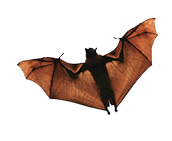All About the Cape Tribulation Tropical Research Station (continued)
The Station
Situated in the heart of Cape Tribulation, the research station
sits about half a kilometre off Cape Tribulation Road, opposite P.K's backpackers' accommodation, on
8.5 hectares of regenerated rainforest. Originally a
cleared block of land, the station's grounds have,
over several decades and with the help of countless volunteers, interns, and researchers,
been restored to much of their former beauty.
Nestled amongst the trees are the station's laboratory building, the kitchen/library block,
the workshop, and six two-room cabins equipped with electricity and running water.
bunkhouse style buildings, and the toilet block. If you come to the station as a volunteer, student, or intern, you will find food to be both plentiful and varied (visitors to the station are encouraged to participate in food preparation - the station has been called "Cape Tribulation Cooking Camp".
The station does not have a formal intern program schedule (after all, we exist primarily to facilitate research). It is impossible to be specific as to what projects will be in progress at the station, but there will certainly
be something new and different! We do research year-round; whether a
specific project is available depends on the idiosyncrasies of the
weather, plants, animals and funding authorities (usually us!). We can
also accommodate student groups of up to a maximum of 20.
The Bat House
The Bat House, located at the entrance to the station facing the main road, is a small environmental education centre where visitors can come to learn about the wildlife of the Daintree rainforest with a special focus on the area's bats. The Bat House features conventional exhibits as well as access to the Bat Trail, a short bushwalking track through an area regularly frequented by a local colony of spectacled flying foxes Sorry, we can't promise the wild bats will be there when you come (the colony is somewhat nomadic and moves in and out of the area on a somewhat irregular basis), but you'll still be able to have a face-to-face with real, live flying foxes, members of the station's captive flying fox colony. The Bat House also sells books, T-shirts, toys, and souvenirs of the local area. Proceeds from the Bat House helpl fund the research activities of the Cape Tribulation Tropical Research Station, feed the resident flying foxes, and help the yearly rescue of orphaned spectacled flying-fox babies who have lost their mothers to tick paralysis and predation. All Bat House staff are volunteers.
Research Facilities
We are a very well equipped field station - we have 2 dehumidified laboratories (one for electronic design and service and one for biological work) and a well equipped workshop (it’s amazing what we can produce to answer a research problem!) . We also have a quite extensive library (no journals, though (sorry - they are far too expensive and bulky to keep up-to-date). The biological lab has a gas chromatograph, HPLC, computer facilities (Mac and PC), microscopy (stereo microscopes and high power microscopes - including phase), plus a range of other field gear (just ask). Not all of it is the latest - but for most field work that is not an issue. The electronics lab has oscilloscopes, a spectrum analyser and signal generators - plus the usual other equipment (power supplies, etc). We also have a fairly well stocked chemical store.
About Us (printable brochure)
This brochure explains a bit more about the Cape Tribulation Tropical Research Station and the Bat House - who we are, what we do, and a bit about why we do it. It also provides contact information for the station so you can request further information, ask questions, or provide feedback about the Bat House and the station. (Don't worry - we're incredibly friendly and would love to hear from you!)

